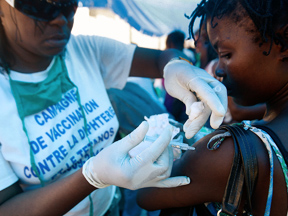Health
The United Nations, since its inception, has been actively involved in promoting and protecting good health worldwide. Leading that effort within the UN system is the World Health Organization (WHO), whose constitution came into force on 7 April 1948. At the outset, it was decided that WHO’s top priorities would be malaria, women’s and children’s health, tuberculosis, venereal disease, nutrition and environmental sanitation. Many of those remain on WHO’s agenda today, in addition to such relatively new diseases as HIV/AIDS.
In 1948, WHO took over the responsibility for the International Classification of Diseases, which has become the international standard for clinical and epidemiological purposes. Between 1952 and 1964, WHO’s efforts had reduced the global prevalence of yaws –– a crippling and disfiguring disease that afflicted some 50 million people in 1950 –– by more than 95 per cent. Between 1967 and 1979, WHO’s efforts led to the eradication of smallpox –– the only time a major infectious disease has been completely eradicated. Since its Global Polio Eradication Initiative was launched in 1988, through 2006, the number of cases was reduced by more than 99 per cent –– from 350,000 per year to less than 2,000.

WHO staff are at work on the ground in 147 countries worldwide. They advise ministries of health on technical issues and provide assistance on prevention, treatment and care services throughout the health sector. Six regional WHO offices coordinate and support these efforts, while giving special attention to adapting global HIV/AIDS policies to fit the specific needs of their region –– for example in sub-Saharan Africa, where the epidemic is largely spread by heterosexual sex, as compared with Eastern Europe, where injecting drug use is the primary mode of transmission.
In short, WHO interventions cover all areas of the global health-care spectrum, including crisis intervention and the response to humanitarian emergencies; establishing International Health Regulations, which countries must follow to identify disease outbreaks and stop them from spreading; preventing chronic diseases; and working to achieve the health-related Millennium Development Goals (MDGs).
Global Strategy for Women’s and Children’s Health mobilizes resources to save the lives of more than 16 million women and children
In the lead-up to the Millennium Development Goals (MDGs) Summit in September 2010, the Secretary-General launched a global effort convening 40 key leaders to define a collective strategy for accelerating progress on women's and children's health .
But it would be misleading to suggest that the entire work of the UN system in support of global health rests with the WHO. On the contrary, many members of the UN family are engaged in this critical task. Many health-related matters addressed directly by the General Assembly and the Economic and Social Council, as well as through the efforts of the Joint United Nations Programme on HIV/AIDS (UNAIDS); the work of the United Nations Population Fund (UNFPA) in support of reproductive, adolescent and maternal health; and the health-related activities of the United Nations Children’s Fund (UNICEF).
In addition, such members of the UN system as the International Labour Organization (ILO), the United Nations Relief and Works Agency for Palestine Refugees in the Near East (UNRWA), the Food and Agriculture Organization of the United Nations (FAO), the International Atomic Energy Agency (IAEA), the United Nations Environment Programme (UNEP), the United Nations Office on Drugs and Crime (UNODC), and the World Bank, among others, all play a key role in promoting global health.
Health-related decades now being observed internationally, as declared by the General Assembly, include the Decade to Roll Back Malaria in Developing Countries, Particularly in Africa (2001-2010) and the International Decade for Action, “Water for Life” (from 22 March 2005).
Annual international observances relating to health, as proclaimed by the General Assembly, include World Water Day (22 March), World Autism Awareness Day (2 April), World Health Day (7 April), World No-Tobacco Day (31 May), the International Day against Drug Abuse and Illicit Trafficking (26 June). World Mental Health Day (10 October), World Diabetes Day (14 November) and World AIDS Day (1 December).
Everyone has the right to a standard of living adequate for the health and well-being of himself and of his family, including food, clothing, housing and medical care and necessary social services, and the right to security in the event of unemployment, sickness, disability, widowhood, old age or other lack of livelihood in circumstances beyond his control.
—Universal Declaration of Human Rights (Article 25, para. 1)